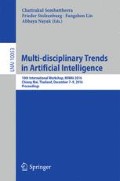Abstract
Ontology learning helps to bootstrap and simplify the complex and expensive process of ontology construction by semi-automatical-ly generating ontologies from data. As other complex machine learning or NLP tasks, such systems always produce a certain ratio of errors, which make manually refining and pruning the resulting ontologies necessary. Here, we compare the use of domain experts and paid crowdsourcing for verifying domain ontologies. We present extensive experiments with different settings and task descriptions in order to raise the rating quality the task of relevance assessment of new concept candidates generated by the system. With proper task descriptions and settings, crowd workers can provide quality similar to human experts. In case of unclear task descriptions, crowd workers and domain experts often have a very different interpretation of the task at hand – we analyze various types of discrepancy in interpretation.
Access this chapter
Tax calculation will be finalised at checkout
Purchases are for personal use only
References
von Ahn, L., Dabbish, L.: Designing games with a purpose. Commun. ACM 51(8), 58–67 (2008). http://doi.acm.org/10.1145/1378704.1378719
Cheatham, M., Hitzler, P.: Conference v2.0: An Uncertain Version of the OAEI Conference Benchmark. In: Mika, P., Tudorache, T., Bernstein, A., Welty, C., Knoblock, C., Vrandečić, D., Groth, P., Noy, N., Janowicz, K., Goble, C. (eds.) ISWC 2014. LNCS, vol. 8797, pp. 33–48. Springer, Heidelberg (2014). doi:10.1007/978-3-319-11915-1_3
Demartini, G., Difallah, D.E., Cudré-Mauroux, P.: ZenCrowd: leveraging probabilistic reasoning and crowdsourcing techniques for large-scale entity linking. In: Proceedings of the 21st International Conference on World Wide Web, pp. 469–478. ACM (2012)
Eckert, K., Niepert, M., Niemann, C., Buckner, C., Allen, C., Stuckenschmidt, H.: Crowdsourcing the assembly of concept hierarchies. In: Proceedings of the 10th Annual Joint Conference on Digital Libraries, JCDL 2010, pp. 139–148. ACM (2010)
Gil, Y.: Interactive knowledge capture in the new millennium: how the semantic web changed everything. Knowl. Eng. Rev. 26(1), 45–51 (2011)
Howe, J.: Crowdsourcing: why the power of the crowd is driving the future of business (2009). http://crowdsourcing.typepad.com/
Krause, M., Smeddinck, J.: Human computation games: a survey. In: Proceedings of 19th European Signal Processing Conference (EUSIPCO 2011) (2011)
Landis, J., Koch, G.: The measurement of observer agreement for categorical data. Biometrics 33(1), 159–174 (1977)
Liu, W., Weichselbraun, A., Scharl, A., Chang, E.: Semi-automatic ontology extension using spreading activation. J. Univ. Knowl. Manag. (1), 50–58 (2005)
Noy, N.F., Mortensen, J., Musen, M.A., Alexander, P.R.: Mechanical turk as an ontology engineer? Using microtasks as a component of an ontology-engineering workflow. In: Proceedings of the 5th Annual ACM Web Science Conference, WebSci 2013, pp. 262–271 (2013)
Sarasua, C., Simperl, E., Noy, N.F.: CrowdMap: crowdsourcing ontology alignment with microtasks. In: Cudré-Mauroux, P., Heflin, J., Sirin, E., Tudorache, T., Euzenat, J., Hauswirth, M., Parreira, J.X., Hendler, J., Schreiber, G., Bernstein, A., Blomqvist, E. (eds.) ISWC 2012. LNCS, vol. 7649, pp. 525–541. Springer, Heidelberg (2012). doi:10.1007/978-3-642-35176-1_33
Savenkov, V., Wohlgenannt, G.: Similarity metrics in ontology evolution. In: Klinov, P., Mourmotsev, D. (eds.) KESW 2015, Posters and Position papers. Moscow, Russia, October 2015
Wohlgenannt, G.: Leveraging and Balancing Heterogeneous Sources of Evidence in Ontology Learning. In: Gandon, F., Sabou, M., Sack, H., d’Amato, C., Cudré-Mauroux, P., Zimmermann, A. (eds.) ESWC 2015. LNCS, vol. 9088, pp. 54–68. Springer, Heidelberg (2015). doi:10.1007/978-3-319-18818-8_4
Wohlgenannt, G., Belk, S., Schett, M.: Computing Semantic Association: Comparing Spreading Activation and Spectral Association for Ontology Learning. In: Ramanna, S., Lingras, P., Sombattheera, C., Krishna, A. (eds.) MIWAI 2013. LNCS (LNAI), vol. 8271, pp. 317–328. Springer, Heidelberg (2013). doi:10.1007/978-3-642-44949-9_29
Wohlgenannt, G., Sabou, M., Hanika, F.: Crowd-based ontology engineering with the uComp protege plugin. Semantic Web J. (SWJ) p. Accepted/Scheduled for publication (2015)
Wohlgenannt, G., Weichselbraun, A., Scharl, A., Sabou, M.: Dynamic integration of multiple evidence sources for ontology learning. J. Inf. Data Manag. 3(3), 243–254 (2012)
Acknowledgments
The work presented in this paper was created based on results from project uComp. uComp received the funding support of EPSRC EP/K017896/1, FWF 1097-N23, and ANR-12-CHRI-0003-03, in the framework of the CHIST-ERA ERA-NET.
Author information
Authors and Affiliations
Corresponding author
Editor information
Editors and Affiliations
Rights and permissions
Copyright information
© 2016 Springer International Publishing AG
About this paper
Cite this paper
Wohlgenannt, G. (2016). A Comparison of Domain Experts and Crowdsourcing Regarding Concept Relevance Evaluation in Ontology Learning. In: Sombattheera, C., Stolzenburg, F., Lin, F., Nayak, A. (eds) Multi-disciplinary Trends in Artificial Intelligence. MIWAI 2016. Lecture Notes in Computer Science(), vol 10053. Springer, Cham. https://doi.org/10.1007/978-3-319-49397-8_21
Download citation
DOI: https://doi.org/10.1007/978-3-319-49397-8_21
Published:
Publisher Name: Springer, Cham
Print ISBN: 978-3-319-49396-1
Online ISBN: 978-3-319-49397-8
eBook Packages: Computer ScienceComputer Science (R0)

